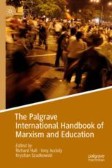Search
Search Results
-
On Relations Between Education and Machines
In the data era when the Fourth Industrial Revolution is quickly progressing, the pedagogy must consider the relations between education and machines...
-
Scribble on Screens and by Machines
This chapter explores examples of both ‘deep’ and ‘shallow’ screen scribbles, without intending a positive or negative value judgement on either....
-
Postdigital Humans: Technology and Divine Design
This chapter considers one aspect of God’s appearance in the postdigital condition: the human imperative to create technology in a manner that...
-
What Are Postdigital Humans?
This chapter suggests that challenge of the postdigital human is to recognize the ways in which balance must be brought to bear, to realize the ways...
-
Toward a ‘More-Than-Digital’ AI Literacy: Reimagining Agency and Authorship in the Postdigital Era with ChatGPT
This paper explores the potential of a ‘more-than-digital’ view toward agency and authorship in the postdigital era. By examining students’...
-
From Monsters to Mazes: Sociotechnical Imaginaries of AI Between Frankenstein and Kafka
The emergence of ChatGPT and other Generative AI tools (GenAI) capable of producing human-like texts sparked debates concerning whether we are at the...
-
The Emergence and Progression of AI in Comparative and International Education
The history and evolution of AI reveal many twists and turns, but a consistent thread in the story of AI is the humans’ fascination to (re)create...
-
From Thriving Developers to Stagnant Self-Doubters: An Identity-Centered Approach to Exploring the Relationship Between Digitalization and Professional Development
This article reports a study illustrating the relationship between digitalization and professional development from an identity-centered perspective....

-
Outsourcing Humanity? ChatGPT, Critical Thinking, and the Crisis in Higher Education
This article analyses ChatGPT from the perspective of the philosophy of education. It explores ChatGPT’s implications for universities, focussing on...
-
Young Children and Environmental Sustainability: An Emerging Relationship
Tied to children’s perceptions of the environment discussed in the previous chapter, were their ideas about environmental sustainability, what it...
-
Realities vs expectations: children’s perception and imagination of AI
Based on Folk theory, Media Equation, and AI literacy research, the study constructed an interview outline and selected 72 students in 4th and 5th...

-
Postdigital Humans: Algorithmic Imagination?
Assuming there are two main possibilities of postdigital humans, either enhancements of existing humans employing the digital or entirely new forms...
-
Deconstructing the anthropocentrism versus ecocentrism binary through Māori oral fire traditions
At the heart of sustainability is the relationship between humans and the planet. The binary of anthropocentric or ecocentric worldviews appears to...
-
Making Sense of Neoliberalism’s New Nexus Between Work and Education, Teachers’ Work, and Teachers’ Labor Activism: Implications for Labor and the Left
This chapter explains how educational researchers have come late to understanding the new nexus between work and education in capitalism. I summarize...
-
Arts and Recent Technology, Exploring Responses in Times of Change
Technology has functioned as a useful and complementary tool for expanding creativity and arts and culture education. Science and technology are also...
-
“You give a little bit more love to animals than to robots”: primary pupils’ conceptions of ‘programming’ and programmable artefacts
Although digital technology is an important part of young people’s lives, previous research implies that they have a limited understanding of what...
-
Wisdom and Power: Using Information Theory to Assess the Transactional Relationship Between the Learner and the Knowledge Provider
As instructional designers continue to assess their design process, the need only intensifies for having a deeper understanding of how it connects to...
-
Narrative and Personhood: A Fraught Relationship
The concept of narrative has attracted the attention of writers across the humanities and social sciences (including William James, Jerome Bruner,...
-
For Technological Literacy Education: Comparing the Asymmetrical View of Heidegger and Symmetrical View of Latour on Technology
Students today are habitual users of digital technology. However, they do not examine the nature of their relationship with technology. Even though...
